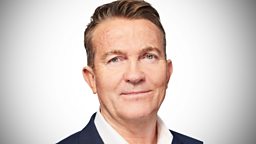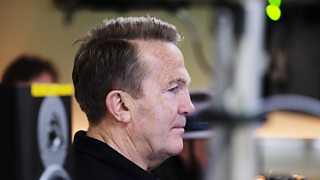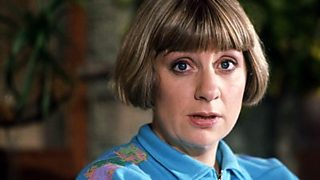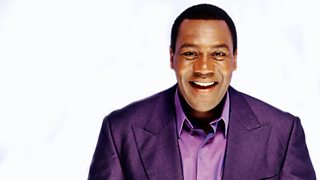Nine things we learned from Bradley Walsh's Desert Island Discs
Bradley Walsh is probably best known these days as the presenter of the BAFTA-winning quiz show The Chase, but he’s also worked as an actor, a comedian, a singer and even as a professional footballer.
It was only after injury cut short his football career at Brentford FC that he turned to entertainment, working first at a holiday camp and then becoming a stand-up comedian. As well his TV presenting work, he’s acted in high-profile series including Coronation Street, Law & Order: UK and more recently Doctor Who and The Larkins. And he’s still found the time to record two albums which both made the UK Top 10: his 2016 album Chasing Dreams was the biggest selling debut by a British artist that year.
Here’s what we learned from his Desert Island Discs...

1. Bradley gets his work ethic from his mum Margaret
“I remember my mum would have two or three jobs at one time to keep us going because my mum and dad had separated,” Bradley recalls.
She worked as an auxiliary nurse, and then as a psychiatric nurse but Bradley also remembers her working in a canteen.
“I adopted the same thing because when I was younger I ended up with about four jobs at one time.” At the age of 13, Bradley worked as a baker’s boy, getting up at 4.30am and heading to work. “I'd help unload the van, stack all the shelves ready for [the shop] to open. I would then go back home, go back to bed, reset the alarm, get up and go to school.”
And looking back, what does he think about it now? “It never did me any harm! I just had so much energy and I always wondered if back in the day I had like an ADHD type thing. I've never been diagnosed… I was like a live wire. I was like a firecracker in everything I did and I ran everywhere, I ran everywhere.”
2. Bradley’s dad had a very busy weekend routine
“He was a very funny man. I used to go and watch him play football and was very proud of him. He was a good local footballer. He was just a man’s man. Back in the day in the 60s - they used to work all week and then on a Friday at around four o'clock they would go into a pub and then get home quite late.”
“He would watch me play football on a Saturday morning, for my team or my school and on a Saturday evening he would sit in the club or the pub and drink and then on a Sunday morning would go and watch Sunday morning football. He would then sit in the pub until sort of two or three o'clock, come home, have Sunday dinner, and then say to my mum, right, we're going out and my mum's evening would be either going to the club or up the pub.”
3. One of his desert island tracks takes him back to Saturday mornings as a young teenager
“In Watford there used to be a club called the Top Rank and it used to be a Saturday morning sort of dance hall. We used to go as school kids, [aged] 13, just running around like maniacs, whenever they played this song.”
“We'd all get up and just run about and jump and dance, and I’ll never forget it. And that was the worst song you could ever imagine because it used to be like setting a load of fireworks off! We used to go potty!”
The song is March of the Mods by Joe Loss and his Orchestra, originally released in 1964.

4. His very first match as a professional footballer slipped his mind
“I was playing for a local side called Leavesden Hospital which was where my mum worked as a psychiatric nurse. Unbeknownst to me, Brentford had been watching me for a little while and after the game the groundsman and scout, a guy called Dave Bromley came up to me and said: ‘We've been watching you for a few weeks and we want you to come and play at Brentford’, and I said, ‘Oh OK.’”
“Now this is a Saturday afternoon. I can't believe it.” The game was on Monday night, against Southend United."
“I end up having a drink after the game on Saturday, then having a few more drinks and a few more drinks like you do on a Saturday night… I get up on a Sunday morning. I play football on Sunday morning. Have a few drinks. I'm not married, no kids, I’m just a young lad. Go out Sunday night, have a few more drinks. Get up for work Monday morning. I go to work at Rolls Royce in the factory - bit of a hangover.“
“I come home from work. I'm sitting in my mum’s front room, seeing my mum having a cup of tea. There's a knock on the door. I'm watching the telly and my mum answers the door. She comes back in, says Brad, ‘There's someone here for you.’” and I walked to the door."
“He goes ‘Right? Are you ready?’ I’m like ‘Oh my God, oh wow, so sorry, so sorry.’ We go to Griffin Park [home of Brentford FC]. I put my kit on. I go out and play. I have the game of my life. I scored the winner.”
The club signed Bradley that evening and he went on to play for Brentford FC for two seasons.
5. The end of his football career was distressing at the time – but Bradley had the last laugh
A new manager called Fred Callaghan came to Brentford with the ambition of promotion. Bradley, who’d suffered several injuries in his time there, was sacked.
“He said,” remembers Bradley “‘I'm letting you go,’ and he fired me. I was devastated.”
“But strangely enough,” continues Bradley, “Fast forward about 37 years and I am at a charity dinner… and I get a phone call from a friend and he says ‘I've got someone sitting next to me…’ and he said ‘It's Fred Callaghan.’ It’s the manager who sacked me all those years ago and I went ‘Hello Fred.’”
“So he said ‘Who's that?’ I said, ‘It's Bradley Walsh.’ He laughed his head off and he went, ‘I'll bet you're glad I sacked you now!’”
“I just laughed. I said, ‘Thanks very much, Fred, you did me a proper turn.’”
6. A holiday changed the course of his life
Bradley enjoyed a trip to Majorca with six friends after finishing his time as an apprentice at Rolls Royce.
“And they said ‘Brad, enter the talent competition. Do your Norman Wisdom impression and your Worzel Gummidge’, because all the holiday makers were English.”
“So I did it and I won and a guy comes up to me afterwards. He says, ‘Have you ever thought about getting into the entertainment industry?’ I went, ‘No.’ He said, ‘Do yourself a favour when you get back to England, get an audition and become a Bluecoat at Pontins, and that's exactly what I did.”
7. His TV career developed after he spotted a gap in the market
Bradley’s early act “was mainly impressions and it was mainly standard jokes. ‘This fellow walks into a pub’, that sort of stuff and I'm not sure I was learning. I didn't really start learning until I actually went to Blackpool. I used to then write about the local area and all of a sudden it became observational.”
After working on the comedy circuit, Bradley saw a niche opening up for someone like him:
“There was a time when they'd stopped having performers on television. They didn't want [Bob] Monkhouse anymore; they didn't want Bruce Forsyth anymore… and that left a massive gap. Someone who is good, who could do a bit of stand-up comedy, think on their feet and be a bit of a one-stop shop, if you needed a song they could do it. If they needed to be with the general public and work, they could do it.”
“No one was doing that at the time, and that was a niche that needed filling, and I thought that's where I need to be.”
8. He flopped in front of an arena crowd – and developed a new way of working
Bradley went on to work as a support act to some of the biggest stars in music, including Shirley Bassey, Leo Sayer and Sir Tom Jones.
Performing in front of the biggest crowd of his life, 11,000 people, Bradley was told by Tom Jones’s tour manager to get on stage and do his 25 minutes. Nerves got the better of him, his mouth dried up and he started talking too fast. Finally, after 15 nerve-wracking minutes a much relieved and very shaken Bradley came off stage only to be greeted by the same tour manager with the words:
“‘Wait! Where you going?’ He said ‘Get back out there!’ I went ‘No.’ He said, ‘Tom is not here. Get back out there!’ I said, ‘I can't do anymore.’”
“He said. ‘Out!’ And he got me, turned me round and pushed me back on stage.”
“And I went back on stage and then I started doing a load of stuff just to ad lib and sort of got away with it until Tom arrived. That’s when I thought 'Hello, this is now a bit of improv' and all of a sudden I started working in a different way. It came together and I learnt how to play those big arenas.”
9. At his audition for The Chase, Bradley came up with the nicknames for two of the Chasers
Bradley was playing Ronnie Brooks in the UK version of the TV drama Law & Order when he was offered the chance to audition as the host of a new quiz show.
“I missed working in the studio, I missed the quickness of it… It's very tedious on a drama and there's a lot of waiting to do your bit.”
The day came for the audition which was taking place in an office.
“I've now got the bosses of ITV there. I've got a table in front of me and I've got Shaun Wallace, who became the dark destroyer in front of me, and I got Mark Labbett.”
“So I said to Mark Labbett, first of all, I said ‘That’s an unusual name, French?’ He said ‘Yes, it stands for the beast.’ I said, ‘Well, that's what you are then, you're The Beast.’”
“I said to Shaun Wallace, ‘Shaun, what do you like?’ He said 'I love boxing.’”
“I said, ‘Who's your favourite boxer?’ He said, Nigel Benn, The Dark Destroyer.’ I said ‘You’re now The Dark Destroyer.’”
The names stuck, and The Chase has run very successfully since 2009, most recently winning the TV BAFTA for the best daytime show.






